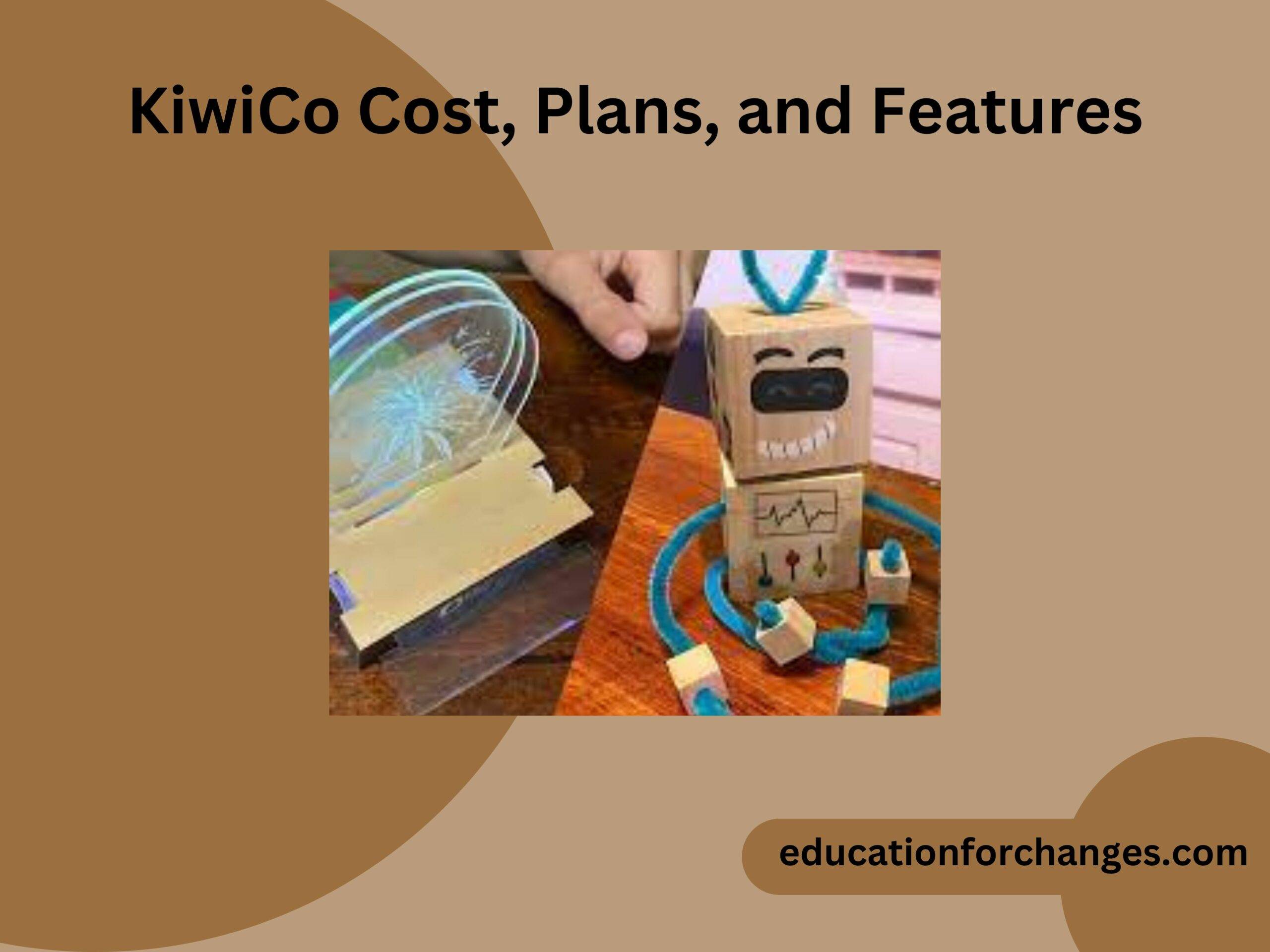LingQ Review 2024: Should You Use It? (Honest Review)
Stuck between choosing a platform to learn a new language? LingQ can be a savior for you. Learning a language means developing each aspect properly. From developing pronunciation to reading skills, every skill is important. LingQ has helped me to improve them all. I know, that choosing the platform without knowing completely about it, isn’t worth it. Thus, I will give a detailed LingQ review in this guide.
Read it till the end and decide if it’s a perfect choice for you.
Quick Takeaways
- There are over 49 languages on the platform.
- Despite being an awesome platform for learning a language, its not a superb platform for Chinese and Japanese courses.
- There is also a community of people where I can connect with other people to get a written language exchange.
- It also has tutors to correct your mistakes.
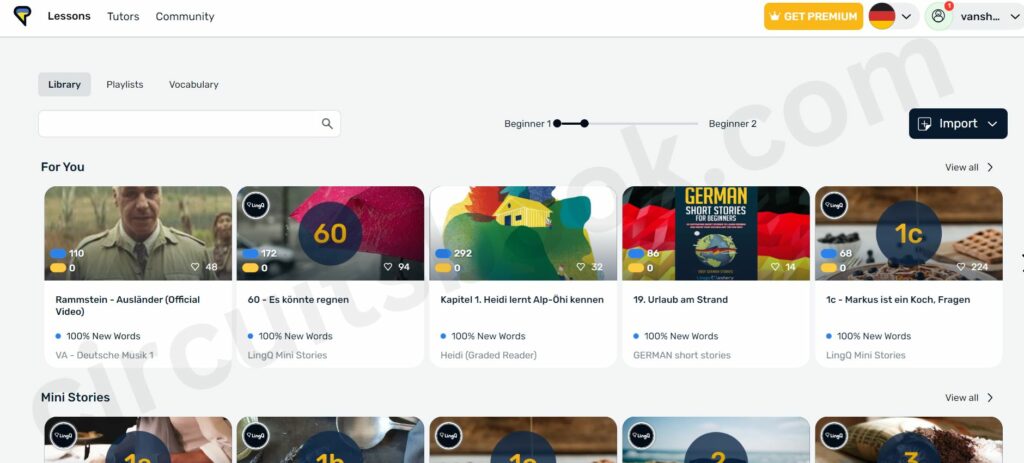
What is LingQ?
As mentioned above, LingQ is a language learning platform featuring multiple resources to teach a language. There are podcasts, articles, and other resources including a deep knowledge of the language. The platform has a lot of audio and written content on it. I enjoy using this platform as it helps me to get immersed in the language. Thus, there is written and audio input as the basis of the lesson.
Languages available
There are 49 languages on this platform. The table below shows all of them-
| Arabic | Persian | Esperanto | Cantonese | Serbian | Polish | Italian |
| English | Finnish | Armenian | Esperanto | Korean | Croatian | Russian |
| French | Belarussian | Dutch | Gujarati | Latin | Hebrew | Malay |
| Afrikaama | Norwegian | Bulgarian | Chinese (Traditional) | Greek | Swedish | Hungarian |
| Japanese | Indonesian | Turkish | Chinese | Catalan | Romanian | Turkish |
| German | Portuguese | Danish | Ukrainian | Icelandic | Slovak | Czech |
| Khmer | Macedonia | Hindi | Vietnamese | Slovenian | Tagalog | Georgian |
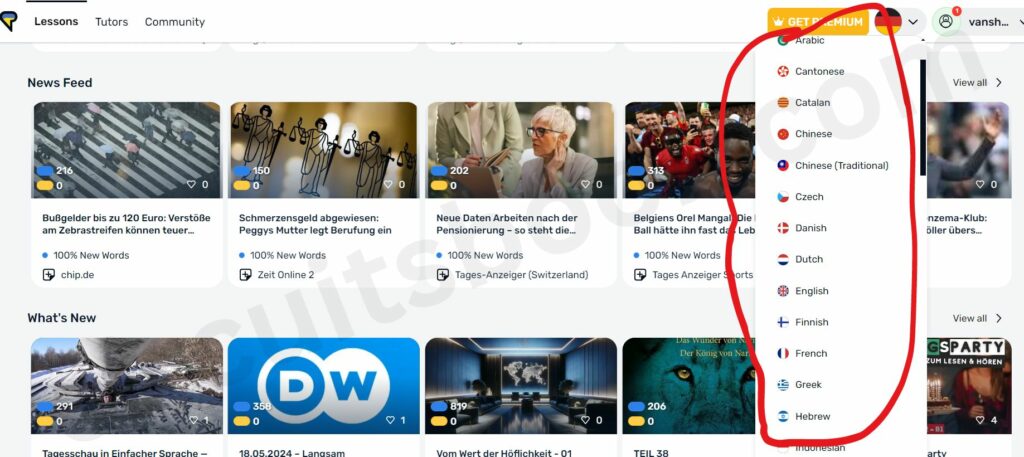
Pricing
LingQ is a platform that has 2 types of plans –
- Premium
- Premium Plus
Both the plans help in improving the language skills. There are a lot of features you get with it. I have mentioned a few of them-
- Unlimited save words
- Audio playlists
- Offline access
- Unlimited imports
- Statistics tracking and much more
But what is the main difference between both of them? Premium Plus gives you 3000 LingQ points along with the other features of the premium plan.
The pricing of both the plans are mentioned here-
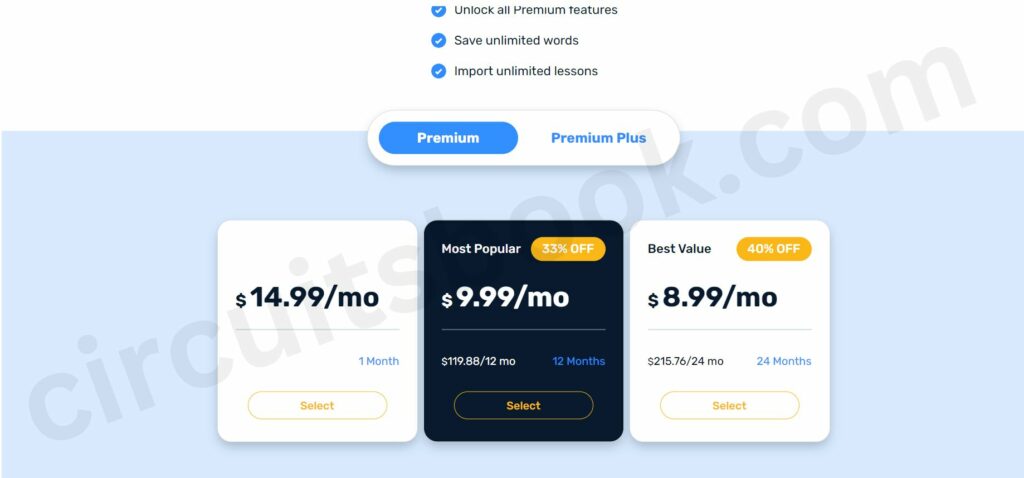
| Duration of the plan | Premium | Premium Plus |
| Monthly | $14.99 per month | $41.99 per month |
| Annually | $119.88 ($9.99 per month) | $443.88 ($36.99 per month) |
| 24 months | $215.76 ($8.99 per month) | $863.76 ($35.99 per month) |
On the other hand, there is no such feature on the free version. There is a limit on the material you import and words to save. Also, in this version, I only got 1 audio playlist.
Course Overview
When I created my account, there was an option to set daily goals just like Duolingo. After that, there was a choice between multiple topics.
There are three main tabs on the platform – Lessons, Tutors, and Community. Let us first talk about the lessons on the platform.
Lessons
When I chose my first lesson, there was a mass of blue words. The only goal was to turn them into either yellow or colorless. It was important to complete the lesson. You must click the blue words or phrases to turn them yellow and create a lingQ. They will buy some new coins and also include flashcards. Choose a definition from the community or the dictionary of your own choice.
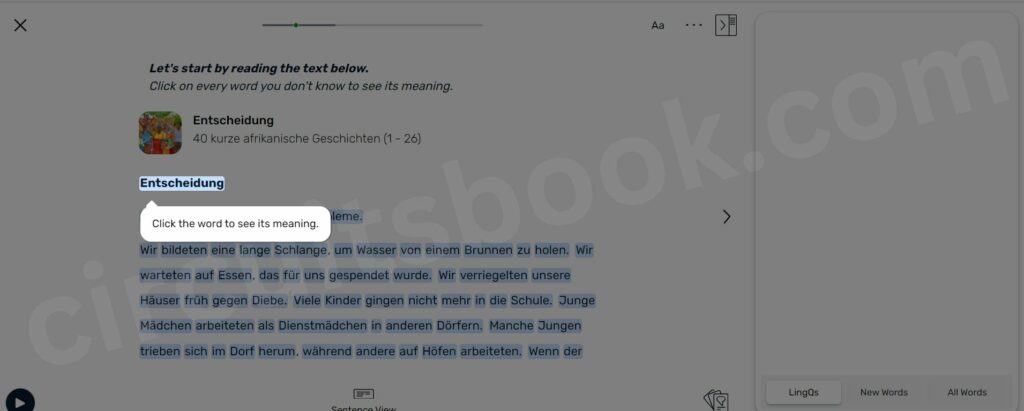
Once you select the definition, there will be some common questions regarding that word. You can choose them or ask related questions. Generally, whenever I chose a word, the doubts I had were already addressed there. Therefore, it was very rare for me to post any questions regarding it. Once it is done, I have to flip to the next. There were again all words marked in blue and at the bottom right-hand corner, I could review the LingQs.
Many of the lessons also have a lot of audio files in them. It was easy for me to adjust the speed. The audio files help me to understand how is speaker can speak. Usually, I try reading the content and then taking the help of the audio files. This trick helps me to ease my listening comprehension.
Lessons on LingQ further involve a lot of features in it. These features helped me a lot in improving my Spanish. It was majorly divided into three sections – Library, Playlists, and Vocabulary. Here are the features that I received on the platform-
1. Native language text and Audio
The major and most important part of the platform is its authentic language-learning content. When I practiced Spanish, the content was exclusively created in that language without much translation from English. No content was specifically created by the users themselves.
The content was mostly from outside sources like podcasts, YouTube, etc. An amazing part of it was the availability of songs in it. The list of topics is the interesting part. I could literary choose from Technology to entertainment.
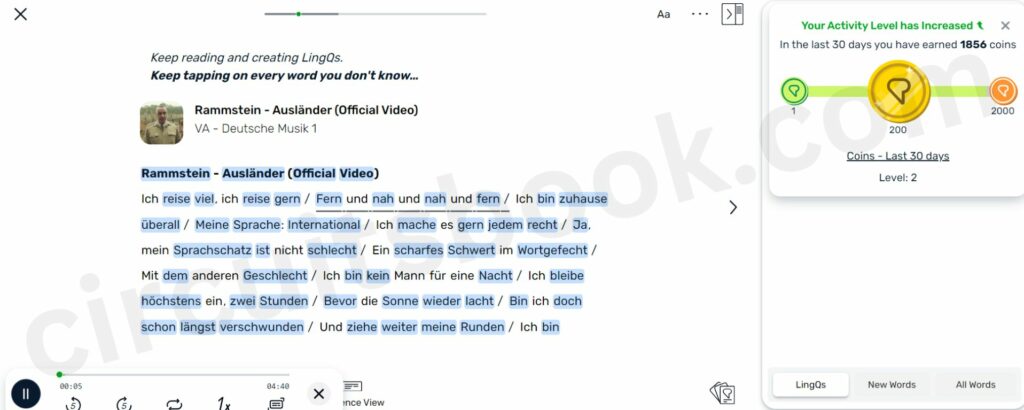
2. Importing own material
I have usually seen this feature on flashcard apps like Anki and Memrise. They allowed me to upload my vocabulary list. Except for them, there was no such platform that allowed me to upload my own content. LingQ is the only app that gives me this freedom. It was easy for me to add ebooks, new articles, YouTube videos, and much more content.
You may be shocked, but it actually allowed me to add Netflix subtitles to it. The desktop version was very easy to use. Within a few seconds, I could directly open the page and start uploading it. So what are you waiting for? Choose a movie, add it to LingQ, and start watching it with the subtitles.
3. Flashcards
The platform has multiple flashcards where I could review a LingQ. There are multiple sections in it-
- Regular flashcards
- Cloze deletions
- Reversal flashcards
- Dictations
- Multiple-choice question
One thing I noticed here was that the sections I received were based on the definitions I chose. As a beginner, it was very hard for me to understand what was going on. However, with time, I could easily move on to new words or phrases.
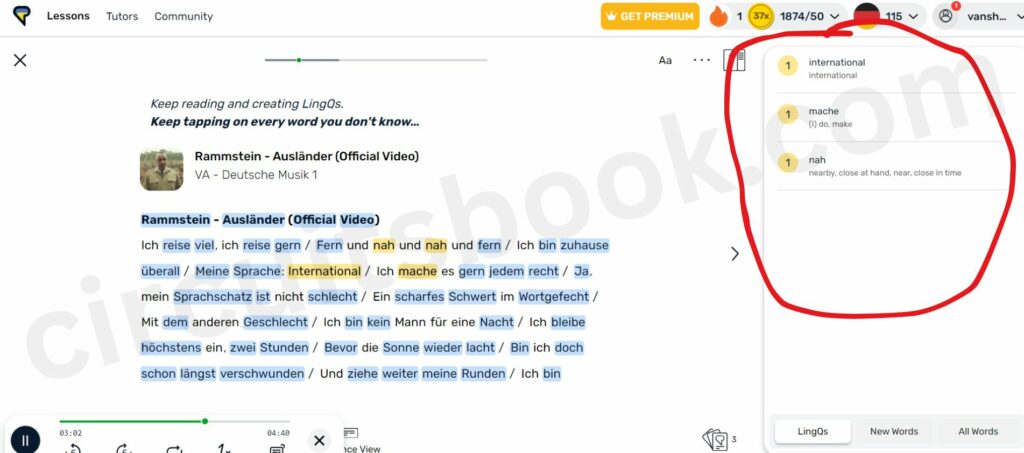
Community
Have you ever heard about the concept ‘Language exchange program’? It’s the one where we connect with native speakers to get help from them. The community feature works similarly to this but more like a writing exchange. There is no verbal communication with others.
It is a place where I could connect with other language learners. The only drawback that I found was not everyone wanted to help me. Whether I would get corrections on my mistake was based on whether the native people wanted to do it or not.
Tutors
Anyone can become a community tutor on this platform. I really think this is not a useful tool. As there is no hiring process, it’s common to find tutors who don’t know much about teaching. Tutors set their own prices for correcting speaking and writing. I would suggest using language resources where you can find live tutors instead of paying these tutors.
Learning Chinese and Japanese: Will LingQ work for them?
I have used LingQ for Spanish, Japanese, Italian, Chinese, and French. From the languages I studied, one thing was clear: the platform’s structure may not be a perfect choice for some languages. When I was learning Spanish and French, I was really enjoying LingQ. But for the Chinese and Japanese, something was missing.
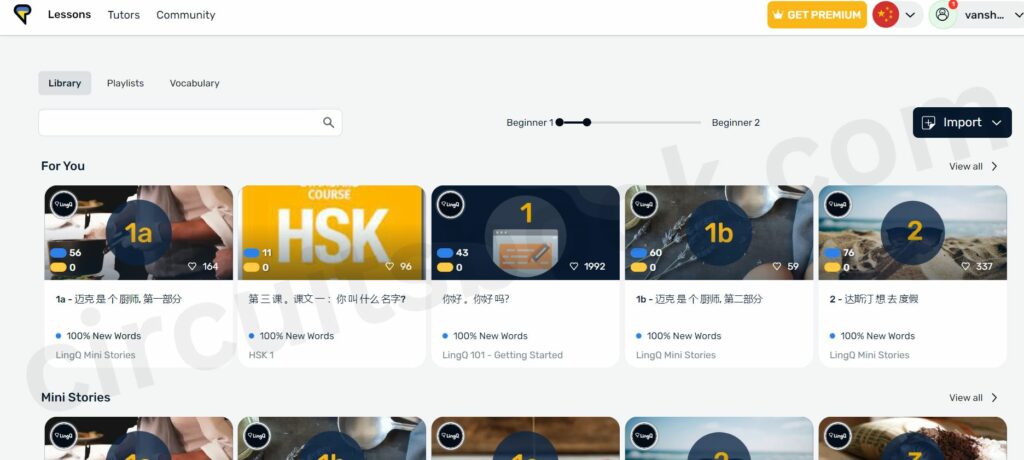
Undoubtedly, when a platform is giving you multiple languages, it is hard to specialize in each language. In both courses, there were fewer context-based definitions and grammatical explanations. Also while writing it, I couldn’t find stroke order diagrams and flashcards.
LingQ Avatar: A feature that helps to stay engaged with the content
As I mentioned above, LingQs helps us to earn coins. But why didn’t I discuss much about it? It’s because they are not important for learning the language. They are just useful to buy the clothing of Avatar and change the background. So is Avatar important? The answer is no. It’s just a way to keep us engaged with the platform. Each piece of clothing is attached to a specific outfit. Also, to get an item on the background, choose the previous items earlier. I really think it’s just a waste of time.
LingQ Review: Should you use LingQ?
Though it’s a great platform to use, the paid version of it is only beneficial. It unlocks multiple features that helped me to develop my language skills a lot. The ability to upload any resource makes it an easy way to Memrise things. There was also a feature that helped me to track daily statistics. However, the question is which plan is worth it? Honestly, I didn’t find the tutors much helpful. Therefore, I would say choosing a Premium plan is worth more than the Premium Plus plan. To make things more clear, I have mentioned the benefits and drawbacks separately-
| Pros | Cons |
| It is very easy to import the material I want to study. | Community teachers are overpriced. |
| Flashcards can help to quiz new words. | Limited original content. |
| The free version does not have much. | Free version does not have much. |
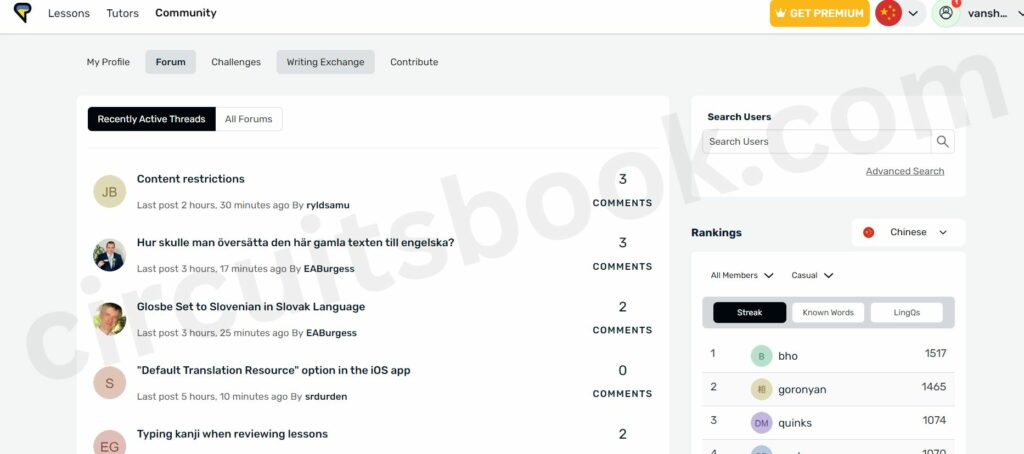
Alternatives to LinQ
From my journey, one thing that I learned is to never stick to only a single platform. Thus, I make sure to focus on multiple platforms at a time. If you also think that you want another platform, here are the alternatives to LingQ
1, Du Chinese – Especially for Chinese
Du Chinese is a platform designed to learn Chinese. As LingQ is not good for Chinese courses, try using this platform. It basically teaches Chinese with the help of reading exercises. It also has a lot of audio lessons and Flashcards to improve the language.
Preply – Live teaching
Preply is a platform where I have many tutors to teach me Spanish. The reason I used it along with LingQ was to get help from them. There are over 120 languages on the platform. This means not only the languages taught in LingQ are available but also many less popular languages. Unfortunately, Danish only has 24 tutors available to teach.
HelloTalk – Language exchange program
HelloTalk is the platform that helped me to get people with whom I can practice the language. Two in-build features helped me to have an easy conversation – Autocorrections and Translation. This platform helped me to make new friends from across the world.
Conclusion
LingQ is a platform that helped me learn the language in a more fun manner. However, to make things work, I need to get the subscription plan first. The free version is limited, but not the paid version of it. There are three sections on the platform: Lessons, Community, and Tutors. Lessons have exciting features that help me learn the language. One of them is the flashcard. Although the courses are awesome, the same can’t be said for Chinese and Japanese. I would recommend checking some alternatives for both courses.
FAQs
Is LingQ completely free?
No LingQ is not a free platform. There is a limitation on the free content of the platform.
Can you become fluent with LingQ?
No, you can not become fluent with LingQ solely. However, it is a perfect way to improve the vocabulary knowledge.

